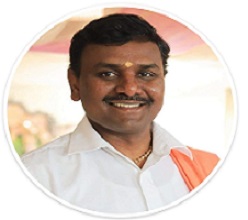YOGA course highlights "principals of Pure Soul" for attaining holistic wellness. It presents the basis of the Atma and the four paths of spiritual practice as prescribed in Shrimad Bhagavad-Gita. The union with self is Yoga and the four paths of Yoga are Karma, Gnana, Dhyana and Bhakti. Karma yoga describes the path of action, Gnana yoga describes the path of knowledge, Dhyana yoga describes the path of meditation and Bhakti yoga describes the path of devotion in the pursuit of union with divine. In this course the participants shall learn the following. The doctrine of rebirth and reincarnation. The law of Karma and its five factors. The principle of Gnana and its components. The process of Dhyana and its essentials. The practice of Bhakti and its methods.
The transliteration textbooks and workbooks have unique QR codes on every page. One can scan the QR code using a smart phone or a tablet to access the respective E-Classes anytime and any number of times. Subtitles can be viewed in multiple languages by adjusting the YouTube settings. The transliteration textbooks and E-Classes are given free with the workbooks. The workbooks can be purchased online from the “Publications” page.Workbooks are designed to enhance the learning experience through following activities.
Activity 1: Scan QR codes inside the textbook to know the pronunciation and graphic illustration of verses.
Activity 2: Copywrite verses from the transliteration textbook into the workbooks and fill colours to graphics.
Activity 3: Scan QR codes inside the workbook to understand the word meaning and interpretation of verses.
The course calendar is customisable to suit the convenience and fit the time zone of every individual or institution. Students/Teachers can download this editable course calendar and set the date and time of each E-Class to customise it. The customised course calendar can be implemented to pursue the course.
Students/Teachers can schedule their calendar and follow the same to attend the E-Classes. Each lesson is split into three parts. It is ideal to complete at least one part of the lesson per week. Each part of the lesson would require 30 minutes of E-Learning and 60 minutes of self-learning per week. E-Learning could be pursued in groups or individually. The GitaVidya workbooks are equipped with QR codes on each page, which connect to the E-Classes of that part. The E-Classes can be accessed anytime and any number of times just by scanning the QR codes in the workbook or by clicking the videos given below.
Please watch the following demo video to know how to attend the E-Classes.
Body is our material identity and Atma is our spiritual identity. Union of both is called Yoga. In this lesson we understand the Atma by exploring the secrets of life, death and rebirth. We understand the principal of reincarnation and the divine supremacy. We will learn the austerities of Yoga.
Union of material body with eternal Atma through Karma (action) is called Karma Yoga. Sense objects pollute mind and contaminate actions resulting in sin. In this lesson we will learn the principles of action, renunciation and sacrifice. We distinguish between the actions performed under the influence of different material energies.
Union of material body with eternal Atma through Gnana (knowledge) is called Gnana Yoga. The path of Gnana Yoga involves the study of eternal wisdom available in scriptures such as Bhagavad-Gita, Brahmasutras, Upanishads etc. In this lesson we will understand the essential virtues and austerities for the pursuit of Gnana Yoga.
Mind is the greatest tool when put to work in right direction. Knowledge and wisdom can elevate the human to the higher level. In this lesson we discuss the factors influencing the pursuit of knowledge and the essentials of intellectual progress. We explore the influence of the three modes of energy on mind.
The cycle of life and death is part of material world. Antaraatma is the greatest guide to be followed by the material body. Spiritual wisdom is the heist of all wisdoms. In this lesson we discuss the essentials of spiritual enlightenment. We distinguish the austerities performed under the influence of different material energies.
Project work is designed to stimulate discussion and debate among peers in a creative and fun filled manner. It involves colouring the graphic illustrations and copywriting the shlokas followed by oral presentation of shlokas and a summary of their meaning. Project work is done either individually or in small groups. It is advisable to do the respective project work at the end of each lesson. Each lesson consists of three E-Classes and one Project Work. Students can attend the three E-Classes for three consecutive weeks followed by the respective project work on the fourth week.
Tips: Please download and print the PDF given below. Read the instructions carefully. Use the empty side of the printed page to do the 'project work'.
The respective E-Classes can be instantly accessed by scanning the QR code given on the 'project work' page.

“Poorna Yoga Program” is designed and developed by Shri Gopi Venkateswara Prasad, to offer a broad understanding of Yoga, through graphic interpretation of 140 Gita-shlokas and 96 Yoga-sutras under 22 thematic lessons. Each lesson is structured with three components of learning namely Sadhana, Sodhana and Vaadana, to enable students understand, explore and apply the wisdom of Yoga in daily life. Gopi studied Yoga in its various forms since his childhood. His lifelong interest in Yoga Shastra led to the foundation of PoornaYoga Program in India, Europe and America. His experience in the field of Education has led to the creation of the G-Education model, which is applied in the development and dissemination of structured learning programs such as this one. Gopi has an ‘MBA in Global Management’ from Germany and a ‘Diploma in Physical Education’ from India. His interests include poetry, singing and spiritual art.